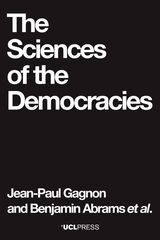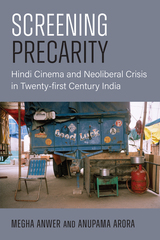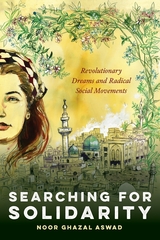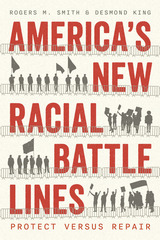
A sobering portrait of the United States’ divided racial politics.
For nearly two decades, Rogers M. Smith and Desmond King have charted the shifting racial policy alliances that have shaped American politics across different eras. In America’s New Racial Battle Lines, they show that US racial policy debates are undergoing fundamental change. Disputes over colorblind versus race-conscious policies have given way to new lines of conflict. Today’s conservatives promise to protect traditionalist, predominantly white, Christian Americans against what they call the “radical” Left. Meanwhile, today’s progressives seek not just to integrate American institutions but to more fully transform and “repair” pervasive systemic racism.
Drawing on interviews with activists, surveys, social network analyses, and comprehensive reviews of federal, state, and local policies and advocacy groups, Smith and King map the memberships and goals of two rival racial policy alliances and delineate the contrasting stories each side tells. They also show that these increasingly polarized racial policy alliances are substantially funded on both the Left and Right.
Placing today’s conflicts in theoretical and historical perspectives, Smith and King analyze where these intensifying clashes may take the nation in the years ahead. They highlight the great potential for mounting violence, as well as the remaining possibilities for finding common ground.

Rogers Smith describes the adverse influence of modern liberalism's governing ideas on the development of American constitutional law and offers a new, more purposive theory to suit contemporary needs. He begins with a fresh analysis of the liberal goals shared by America's constitutional framers and points out the weaknesses of their political thought. Examining vital constitutional doctrines of due process, free speech, voting apportionment, and economic welfare, he demonstrates how contemporary law is often an incoherent patchwork of principles drawn from different historic versions of liberalism.
Smith considers and discards the major modern theories in political philosophy that bear on constitutional law: the democratic relativism of Alexander Bickel and John Hart Ely, the higher-law views inherited from America's religious traditions, and the neo-Kantian liberalism of Ronald Dworkin and John Rawls. Returning instead to the early liberalism of John Locke, he suggests how a theory centered on the Enlightenment commitment to promoting human capacities for reflective self-direction, or “rational liberty,” might better guide current constitutional debates.
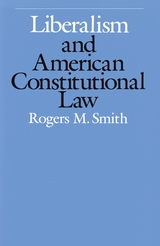
Rogers Smith describes the adverse influence of modern liberalism's governing ideas on the development of American constitutional law and offers a new, more purposive theory to suit contemporary needs. He begins with a fresh analysis of the liberal goals shared by America's constitutional framers and points out the weaknesses of their political thought. Examining vital constitutional doctrines of due process, free speech, voting apportionment, and economic welfare, he demonstrates how contemporary law is often an incoherent patchwork of principles drawn from different historic versions of liberalism.
Smith considers and discards the major modern theories in political philosophy that bear on constitutional law: the democratic relativism of Alexander Bickel and John Hart Ely, the higher-law views inherited from America's religious traditions, and the neo-Kantian liberalism of Ronald Dworkin and John Rawls. Returning instead to the early liberalism of John Locke, he suggests how a theory centered on the Enlightenment commitment to promoting human capacities for reflective self-direction, or “rational liberty,” might better guide current constitutional debates.

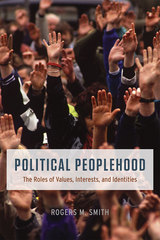
This book gathers Smith’s most important writings on peoplehood to build a coherent theoretical and historical account of what peoplehood has meant in American political life, informed by frequent comparisons to other political societies. From the revolutionary-era adoption of individual rights rhetoric to today’s battles over the place of immigrants in a rapidly diversifying American society, Smith shows how modern America’s growing embrace of overlapping identities is in tension with the providentialism and exceptionalism that continue to make up so much of what many believe it means to be an American.
A major work that brings a lifetime of thought to bear on questions that are as urgent now as they have ever been, Political Peoplehood will be essential reading for social scientists, political philosophers, policy analysts, and historians alike.
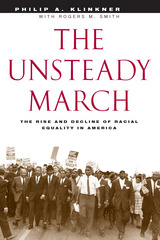
"[An] unflinching portrait of the leviathan of American race relations. . . . This important book should be read by all who aspire to create a more perfect union."—Publishers Weekly, starred review
"Could it be that our unswerving belief in the power of our core values to produce racial equality is nothing but a comforting myth? That is the main argument put forth by Philip Klinkner and Rogers Smith . . . The Unsteady March is disturbing because it calls into question our cherished national belief and does so convincingly. . . . [It] is beautifully written, and the social history it provides is illuminating and penetrating."—Aldon Morris, American Journal of Sociology
Winner of the Horace Mann Bond Award of the W.E.B. Du Bois Institute for Afro-American Research at Harvard University.
READERS
Browse our collection.
PUBLISHERS
See BiblioVault's publisher services.
STUDENT SERVICES
Files for college accessibility offices.
UChicago Accessibility Resources
home | accessibility | search | about | contact us
BiblioVault ® 2001 - 2025
The University of Chicago Press



